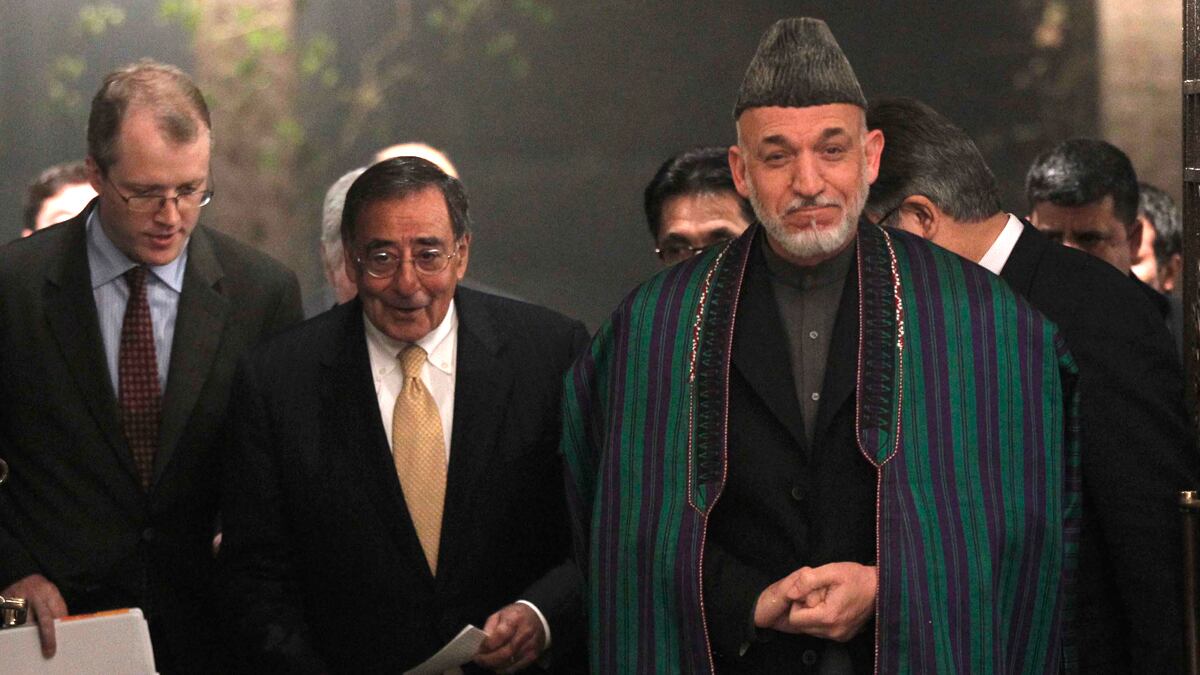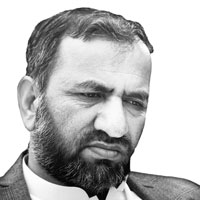Afghan President Hamid Karzai wants American-led, combat night raids to end now, not just before or after 2014 when most, if not all, of American forces are scheduled to withdraw from Afghanistan. That was the strong message that the 54-year-old Afghan leader conveyed this past week in an exclusive interview to Newsweek and The Daily Beast at his heavily guarded presidential palace in Kabul. The president, who was well dressed in a tailored, dark grey shalwar kameez and black sports coat, seemed to be relaxed and in a good mood. But when he talked about what U.S. military commanders call their most effective military tactic against the Taliban—the midnight raids on Afghan compounds and homes that are suspected of being Taliban hideouts—he was emphatic. “Night raids by U.S. forces on Afghan homes must end now,” he said forcefully.
If he digs in and holds to that hardline, inflexible position in his government’s ongoing negotiations with the U.S. over a long-term strategic partnership, he could conceivably kill the deal that would allow a small advisory, support, training and potent special-operations force to remain behind for up to a decade beyond 2014. Iraqi Prime Minister Nouri al-Maliki’s similarly uncompromising stance against giving U.S. troops legal immunity from prosecution in Iraqi courts torpedoed the possibility of a contingent of U.S. troops remaining in Iraq after last December’s withdrawal deadline.
The night raids are not the only possible deal breaker, it seems. The other remaining hot issue is Karzai’s request that the U.S. immediately transfer control of the prison it runs at Parwan, and all Afghan prisoners in U.S. custody in Afghanistan, to the Afghan government. “These we consider to be a violation of our sovereignty,” he said, “and we want them to end all that before we sign the partnership deal.” In a surprise statement that Karzai’s palace released late this week, the president said he wanted control of the prison and the custody of the prisoners transferred into Afghan hands within one month. The U.S. had not seen the prisons and prisoner issue as a serious sticking point in the negotiations. But it may be a major stumbling block now, given the president’s rather unrealistic demand for the transfer to be concluded within such a short time frame. “The rest [of the negotiations are] moving all right,” he added in the interview. “If that’s done, then the Americans will stay here in some form, not with 90,000 troops [like now] but in much lesser numbers in a military and civilian force.”
While Karzai sounds tough, he also makes it clear that he believes Afghanistan’s fledgling security forces, which will grow to some 350,000 by the end of this year, will continue to need U.S. assistance well beyond 2014. “We want to consolidate the gains we have made,” he said. “That will require the continued assistance of the international community with us.” Indeed, he does not agree with U.S. Defense Secretary Leon Panetta’s statement late last year that coalition forces are “winning” the war. “If winning the war means making it harder for the Taliban to launch attacks, that is true,” he said. “If winning the war means bringing security to Afghan lives, then no. We are far away from that.”

When asked to look back on his decade as the country’s leader, a job one senior Western diplomat characterized as “the world’s toughest,” Karzai chose not to accentuate the positive. “Civilian casualties are the saddest thing about the past 10 years,” the president said, “and all the suffering that the Afghan people have endured.” Although over the past two years nearly 80 percent of civilian casualties were caused by the insurgents, he still blames the U.S. for causing too many. “Down, yes, very much down,” he said of coalition-caused civilian casualties. “But night raids continue and the Afghan people are against it. Therefore it has to end.”
The year 2011 was particularly tough for the usually gracious and urbane president. His half-brother, Ahmed Wali, was gunned down last July by one of his security guards. He has also lost a number of close associates to insurgent suicide bombers this past year, including former president Burhanuddin Rabbani, who headed the High Peace Council that was charged with finding a negotiated solution with the Taliban. “I’m not the only Afghan who has gone through sufferings like that. Hundreds of thousands of Afghan families have lost brothers, children, parents. For the past 30 years it has been nonstop,” he said. “So I’m a very small part of this sacrifice, of this suffering, this service to the country. As the president of Afghanistan I look at the suffering of our people as a whole.”
But his personal losses and the country’s do seem to have taken a toll on him. “You will see how quickly he is getting older,” a senior Afghan official told us just before the interview. He puts in 12-hour days at his office from 8 a.m. to 8 p.m., and then usually hosts a dinner for Afghan politicians, tribal leaders, or foreign envoys later in the evening. He only takes half a day off on Fridays. “Physically and psychologically he is not tired,” the senior Afghan official said. But the pace, the pressure and the relentless avalanche of bad news seems to be wearing him down. “He operates under such prolonged and continued stress,” says a sympathetic senior Western official. As a result, Western officials who know him say he is much more volatile and less predictable than ever before.
His adamant opposition to night raids seems a case in point. Karzai is said to be the only senior person in his administration and his military who is against the night raids. Even his military commanders say the country would fall apart without the raids, which have been successful in capturing or killing hundreds of Taliban commanders and which the U.S. says are necessary to keep the insurgents off-balance and weakened. U.S. commanders believe that American and Afghan casualties certainly would shoot up if the raids were stopped. As a result, there seems to be no way that the U.S. could acquiesce to the president’s demand for the night operations to cease. While Afghan forces are being trained to conduct the raids and do participate regularly in the operations, Afghans are years away from being able to launch the night attacks on their own without significant U.S. firepower and transportation assistance.
Part of the tension between the president and the U.S. may be that Karzai seems to believe that he has simply fallen out of favor with Washington because of his constant criticism of American policy in both Afghanistan and Pakistan. “They [the Americans] were not happy with the way I stood up for certain issues in Afghanistan such as [NATO-caused] civilian casualties, night raids, and relations with Pakistan,” he said. On Pakistan, he also says he believes the Americans are fighting on the wrong side of the border. “The war on terror in my view [should not have been fought] in Afghanistan, in Afghan villages and homes,” he added. “But in the [Pakistani] sanctuaries, and the training, motivational and financial grounds that [the Taliban] have there. And the U.S. did not go there for 10 years. We know where the troubles were coming from but they [the Americans] did nothing about it.”
He is also miffed that the U.S. has been talking to the Taliban behind his back over the setting up of a Taliban representative office in the Gulf state of Qatar, even after Washington insists that the peace process must be Afghan led and Afghan owned. “[It’s] definitely not [Afghan led,”] he said. “That’s the problem. We have told the Americans that.” Even so, he said he will support the Qatar option for talks. “We will go along with it for the return of peace to Afghanistan as soon as possible.” He also said that he “welcomed” the statement by U.S. Vice President Joe Biden to Newsweek and The Daily Beast that the Taliban “are not the enemy per se.” “We hope that [statement] will end all the reasons and excuses for the causing of casualties and harm to the Afghan people.”
Karzai says he and his government will maintain their own negotiating track with the Taliban. “We have contacts with our fellow countrymen, the Taliban,” he said. “It will continue.” He added that he believes that the Taliban leader Mullah Mohammad Omar is alive and is most probably living in Pakistan, though he admits he does not have any direct contact with Omar. “If I did [have contact] I’d call him right now and say: ‘Let’s talk, Afghan to Afghan.’” He also said he believed that most Taliban are interested in peace despite their propaganda statements insisting that no negotiations are possible until all foreign forces have withdrawn from Afghanistan. “I think a great many of them are interested in peace,” he said. “At least those who are Afghans and have families in Afghanistan.” He added that there’s another category of insurgent “who is in the pay of this or that intelligence agency,” perhaps a reference to the Haqqani Network, which is close to Pakistan’s Inter-Services Intelligence. “Of course, they do not want peace. But the majority [of the Taliban] do.”
He believes Pakistan could squeeze the Taliban into negotiating seriously if it wanted. “[Pakistan] can and should [squeeze the Taliban] including Mullah Omar,” he said. “Pakistan does have a major role to play with regard to those Taliban whom it accommodates in its own territory. The Pakistani connection to the Taliban is old and real. It is not a fantasy.”
Karzai believes that Pakistan unfortunately does not have what he calls “an independent policy toward Afghanistan.” “It’s as if Pakistan’s policy toward Afghanistan is driven by [the quality of its] relations, either good or bad, with India or the U.S.,” he said. With Pakistan-U.S. relations at an all-time nadir right now, Pakistan is not about to be helpful in the peace process, at least according to Karzai’s calculation.
Karzai swept away any rumors that he would like to amend the Afghan Constitution to allow him to run for a third five-year presidential term in 2014. “No, I don’t think that it’s good for either Afghanistan or for me as a person. I think we should make sure that the Constitution is implemented,” he said. “I will be very happy if I can conduct a fair election for president in two and one-half years from today. Then I will return to life as a citizen of Afghanistan. That would be a great legacy for me. We have to bring in younger blood and new thinking.”
When asked about his reelection in the 2009 presidential race that Western officials and observers believed was rigged in Karzai’s favor, he turns the table on his critics. “There were efforts to have an election they [the West] would label as wrong and fraudulent,” he said. “I refused to accept that.”







